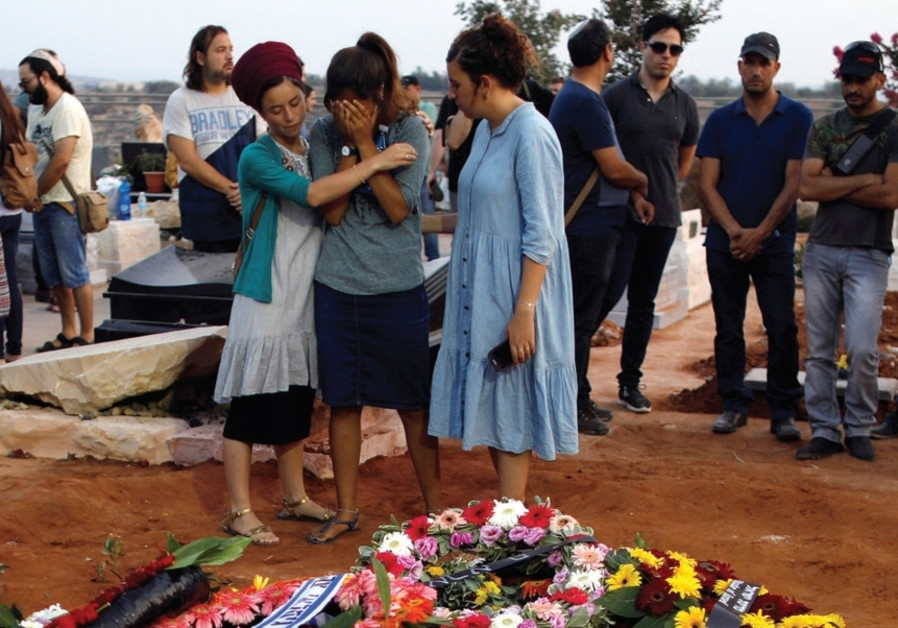
FAMILY AND FRIENDS mourn at the graves of Yosef, Chaya and Elad Salomon, who were buried at the Modi’in Cemetery, on July 23.
(photo credit: REUTERS)
A bill meant to combat the Palestinian Authority’s practice of paying terrorists passed the first reading in the Knesset on Monday evening.
The Defense Ministry’s proposal, which had support from the coalition and much of the opposition, would allow the cabinet to deduct the amount of funding for terrorists from the taxes and tariffs Israel collects for the PA.
The PA paid terrorists more than NIS 1 billion ($347 million) in 2017 and upped the amount to over NIS 1.4b. ($403m.) in its 2018 budget, according to a Defense Ministry report based on the PA’s budget.
Defense Minister Avigdor Liberman expressed hope the bill will pass a final vote this summer.
He cited the American version of the bill, called the Taylor Force Act, which states that the US will not send aid to the PA as long as they continue the terrorist payments.
“We can’t ask others to deduct the terrorist funding” before Israel does, Liberman said. “We can’t lag behind the US. The PA is the largest funder of terrorism against Jews... We must act on this matter.”
Yesh Atid MK Elazar Stern, who proposed a version of the bill, said it “will harm the PA’s means of encouraging terror and will bring us closer to peace.“We must stop the economic incentive that the PA gives terrorists,” he said.
Deputy Defense Minister Eli Ben-Dahan said: “Today, the State of Israel is saying no more... We will show zero tolerance for terror. According to the Defense Ministry’s findings, the PA pays over a billion shekels in a year to terrorists and their families. Imagine how many preschools and schools could be built with that money.”
[Defense Minister] Liberman released calculations of how much the terrorists in several recent attacks are expected to be paid by the PA ahead of Monday’s vote.
The PA is expected to pay the terrorist who slaughtered three members of the Salomon family more than NIS 12.6m. ($3.48m.) over the course of his lifetime.
Omar al-Abed murdered Yosef Salomon and two of his adult children, Elad and Chaya, and wounded Yosef’s wife, Tovah, when they were celebrating the birth of a grandson in their home last year. Elad’s wife hid their children in a nearby room in the house, where they heard the massacre take place. Abed was given four life sentences.
The three terrorists who shot and killed Naama and Eitam Henkin in 2015 while they were driving home with their four children in the car will receive a between NIS 10m. and NIS 11.23m. ($2.77m.-$3.1m.) over the course of their lifetimes.
The lifetime estimate for terrorist payments is calculated based on if they live to age 80.
Security forces arrested Abed al-Karim Adel Asi, the Israeli Arab terrorist who murdered Rabbi Itamar Ben-Gal outside the settlement of Ariel, on March 18, and he has already received his first NIS 1,400 monthly payment. He is expected to receive more than NIS 12.6m. ($3.48m.) during his lifetime.
The average income of a working Palestinian in the West Bank is NIS 2,092 ($580) per month, according to the Defense Ministry, which is what the PA pays terrorists sentenced to three to five years in prison.
The PA pays terrorists who are sentenced to 20 years or more in prison – in other words, those who committed more severe crimes and likely were involved in killing Israelis – five times that amount each month for the rest of their lives.
Terrorists who are Israeli citizens receive a NIS 523 ($145) bonus, which, when added to the amount the PA pays for the most severe crimes, comes to more than NIS 10,461 ($2,900) a month, more than the average Israeli income of about NIS 9,740 ($2,700). There are also increases in pay for being married and for each child a terrorist has.
If a terrorist is released from prison early or dies in prison, he or his family can continue to receive a monthly salary without a time limit on how long the payments are made.
...The Defense Ministry bill states that the amount the PA pays terrorists each month will be deducted from the tax and tariffs Israel collects for the PA.
At the end of each year, the defense minister will present a report to the Security Cabinet on how much the PA paid terrorists that year. The report will be classified unless the minister decides to release it or parts of it.
The Security Cabinet can vote not to deduct the funds or to only withhold part of the amount, “for special reasons of national security and foreign relations of the state,” the bill states. This is a controversial clause, which several MKs in the Foreign Affairs and Defense Committee opposed.
The funds that are deducted will be invested in a fund to pay damages to victims of terror, among other areas.

